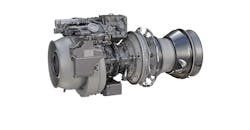GE Aviation Wins $143.5 Million Navy Contract for New Helo Engines
The U.S. Navy issued a contract worth nearly $143.5 million to GE Aviation to cover the cost of Low rate initial production (LRIP) for 22 T408-GE-400 engines, the unit powering the CH-53K King Stallion helicopters. The CH-53K is a heavy-lift cargo helicopter being developed by Sikorsky Aircraft for the United States Marine Corps. It’s anticipated be the largest and heaviest helicopter in the U.S. military, and the USMC expects to order 200 helicopters at a total cost estimated at $25 billion.
The T408 is a gas turbine engine developed by GE Aviation for turboprop and turboshaft aircraft engines. It is based on the GE38 design.
According to the engine builder, three T408 engines rated for 7,378 shp will power each CH-53K, enabling the aircraft to carry a 27,000-lb external load over a mission radius of 110 nautical miles in Navy high/hot weather conditions. This will be three-times the Navy’s current external load carrying capacity with the CH-53E Super Stallion, powered by GE Aviation's T64 engine.
The new contract follows on an April decision by the U.S. Defense Acquisition Board approving the CH-53K for LRIP production, following extensive testing during the CH-53K Engineering Manufacturing and Development (EMD) phase. At that time, GE gained U.S Navy approval to complete the LRIP qualification and the new T408 LRIP contract envisions a 2019 initial operating capability (IOC) program milestone.
The new contract includes approval for logistics support, technical publications, and organic support development of the T408 program.
GE operations in Lynn, Mass.; Hooksett, N.H.; Rutland, Vt.; Madisonville, Ky., Dayton, O., and Jacksonville, Fla., will provide parts for this contract.
Low rate initial production (LRIP) is a term that describes the initial, small-volume production phase of of a defense program, in which the prospective first buyer and operator (here, the U.S. Navy and USMC) are able to begin testing the finished product, in order to gain confidence in the designs and capabilities, and to alter or specify further production requirements. Once the program has entered into a production phase and final acceptance is agreed, further production contracts are issued in accordance with defense budget projections and defense program necessities.
About the Author
Robert Brooks
Content Director
Robert Brooks has been a business-to-business reporter, writer, editor, and columnist for more than 20 years, specializing in the primary metal and basic manufacturing industries.
